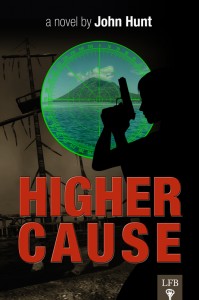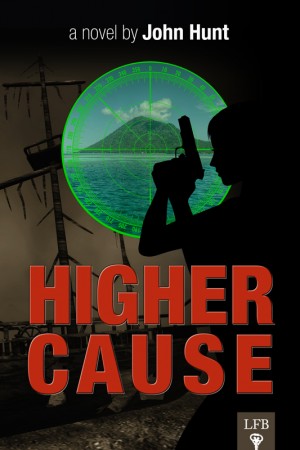

The date has been set for our live author chat with J. Neil Schulman, whose Prometheus Hall of Fame Award–winning novel Alongside Night is being adapted into a film starring Kevin Sorbo (Hercules, Andromeda).
The event will take place via Google+ Hangout on Air on Saturday, November 10th at 9PM EST (that’s 6PM PST / 8PM CST). It will be streamed live for those who cannot fit into the Hangout and a recording will be uploaded to our YouTube channel afterward. For more details, and to RSVP, visit the official event page on Google+.
Here are the official movie trailer, music video, and Schulman’s talk at Libertopia about bringing the book to film:
[continue reading…]
Help Promote Prometheus Unbound by Sharing this Post

This review is part of a series covering each installment of the serialized novel Higher Cause, written by John Hunt and published by Laissez Faire Books. To catch up, start with the announcement, the book’s link-rich table of contents, and the first review.

This week is more about setting things up than reaping payoffs. Onbacher proceeds with his plan to find the Bounty, but that is the only significant plot point in the three chapters. This is not to say that the chapters are skippable, because we catch glimpses of plots and machinations whose culminations will no doubt explode in future chapters, but we do get a little time to catch our breath. There have been some rather kinetic chapters of late, so like a symphony whose music is a contrast of louds and softs, and fasts and slows, and sharps and smooths, we catch our breath and proceed pianissimo, with perhaps one sequence as exception.
There are dark characters lurking on The Island. Hunt once again introduces things slowly, like a tease, as he should. The possibilities are numerous but over the course of the next few chapters we will no doubt start to narrow them down until we find out just what these people are up to.
It bears noting that there has been a lot of reliance on chance partial sightings, conversations improbably overheard, and the like. This technique can quicken the pulse and is often used to get a plot started, or to introduce a twist, but overuse wears out anything. I would hope not to see it used too much more.
We also revisit the Marcos family for another interaction between father and son, one that leaves us more engrossed than it found us. I will say that the removal of one character from the family scenario was a lost opportunity, but there is a hint that she may return. I really want to see more from them.
[continue reading…]
Help Promote Prometheus Unbound by Sharing this Post

I’m pleased to see Laissez Faire Books publishing a new edition of this book. I may be unusual in this, but Anthem happens to be my favorite of Rand’s four major works of fiction. It is pithy, pared down to essentials, and more poetic. This guest editorial was originally published as the editorial preface of the new edition. — GAP

“The author does not understand socialism,” read the letter from MacMillan in reply to the submission of Ayn Rand’s novella, Anthem. They turned it down. Actually, the publisher didn’t understand socialism. Hardly anyone did in 1937, when this book was written. Rand, however, did understand socialism. She understood it so well that she knew it would result in the opposite of what it promised and that its proponents would eventually come to embrace its grim reality, rather than repudiate the system of thought.
In many ways, this book is one of the best dystopian novels ever written because it puts the central focus on the key failing of socialism: its opposition to progress. How is that possible given that progress is a central slogan in socialist thinking? The problem is that by collectivizing private property, socialism removes the machinery of progress itself. It abolishes prices and profits and calculation and the incentive to create. It puts a premium on political control, and politicians resent the revolutionary implications of entrepreneurship. Therefore, a consistently socialist society would not only be poor and backward; it would revel in those features and call them the goal.
Think about it. This was the 1930s, long before the environmental movement and long before the primitivist streak in socialist thinking was to emerge as an outright agenda to be imposed by force. But as a child in the old Soviet Union, Rand had seen it in action. She had seen how entrepreneurship and creativity had to be sacrificed for the collective, and how this drove civilization straight into the ground. A totalitarian society would not be a world with amazing technology and flying cars, but would exist only at a subsistence level. And it would try to stay that way.
[continue reading…]
Help Promote Prometheus Unbound by Sharing this Post

This review is part of a series covering each installment of the serialized novel Higher Cause, written by John Hunt and published by Laissez Faire Books. To catch up, start with the announcement, the book’s link-rich table of contents, and the first review.

We cruise into chapters 30 and 31 with the most recent offering from Higher Cause. Both chapters take place on The Island. They deal with a couple of different strands of plot. A growing suspicion comes closer to being confirmed.
Enough time has passed to allow Petur and Jeff to fully recuperate from their injuries during the attack on the OTEC. Jeff makes a brief appearance before leaving for other areas of the globe as part of his investigations. Elisa, meanwhile, returns to The Island and Petur grows more and more smitten with her.
Elisa continues to dress as unattractively as she can manage, though Petur can see through it and is pretty sure she could be a knockout if she tried. On a couple of different occasions she is caught by surprise by Petur and quickly adjusts her appearance to minimize her appeal. The reasons for this are still unclear, but Petur has begun to wonder about it. This, coupled with another occurrence, makes me suspicious about her motives, although she has been nothing but helpful to Petur and The Island to date.
The alluring brunette whose pheromones have sunk hooks into Petur is seen again, and by now the faithful reader will probably have a good idea as to who she is. If my hypothesis is right, it only heightens my suspicions. It is a plot thread with a lot of promise.
All in all, another successful bit of work. There is, however, one thing that I have been waiting for and have seen little of so far. The Island seems to be functioning smoothly, with a freed economy that is beginning to heat up. However, there is little mention of how they handle the services that government keeps for itself. How are disputes resolved? How is punishment meted out? How are claims adjudicated? The question of security is not so pressing, because the world already has more private security than government cops, but the question of arbitration and enforcement is altogether different.
[continue reading…]
Help Promote Prometheus Unbound by Sharing this Post














